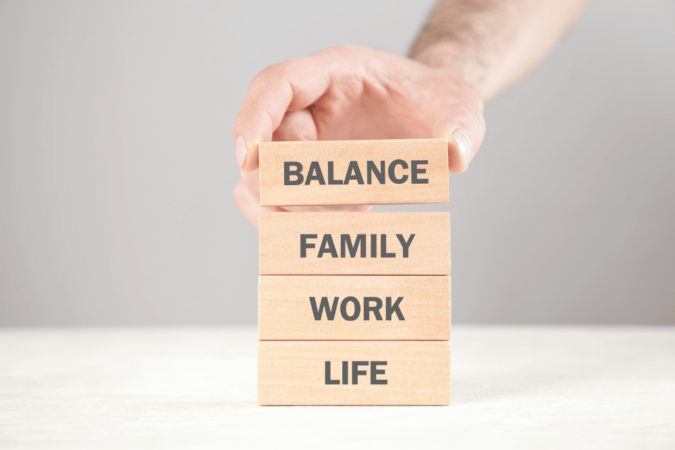
15 Effective Work-Life Balance Tips for a Happier You

Work-life balance is an essential part of leading a healthy and fulfilled life. Striking the right work-life balance means ensuring all aspects of our lives are acknowledged and given attention: work, family time, health, and leisure.
But work-life balance looks different for everyone, and families must work together to evaluate what approach works best for them. It could mean working fewer hours daily or putting more effort into carving out quality time with loved ones.
Maintaining work-life balance includes setting boundaries with work, implementing effective stress-management techniques, and valuing family members as much as work commitments. Taking steps to prioritize work-life will not go unnoticed. It has tangible rewards, including improved mental health and increased well-being.
Understanding Work-Life Balance

Finding work-life balance can be challenging, especially in our current environment of constant communication and hectic workloads. However, taking the time to consider how work-life should be balanced carefully can significantly improve your mental health and well-being.
The most crucial step is to become aware of work-life temptations and prioritize what matters most to you. Consider creating a family calendar for weekly work, leisure, and rest times. This will help you structure time for work and ensure that work does not intrude on family or leisure activities. Learning to balance work and life allows us to lead fuller and happier lives!
The Importance Of Work and Family Life Balance
Work and family balance is essential to leading a fulfilled and productive lifestyle. In today’s hectic world, coping with the demands of work and family responsibilities can be challenging. People may feel overworked, overwhelmed, and stressed out without a proper balance between the two.
An excellent work-life balance ensures that individuals have enough time and energy to devote to their professional and personal obligations, leading to improved mental and physical health. Work-life balance is essential for maintaining one’s overall well-being. When work responsibilities become too demanding, it can lead to burnout or other psychological issues such as depression and anxiety.
Balancing work with family life can help individuals stay motivated and energized, making them more productive at home and in the office. A healthy work-life balance can also prevent people from becoming isolated or feeling disconnected from their families.
Spending quality time with family helps build solid relationships and encourages emotional support. This connection is necessary for individuals to stay grounded and feel supported in their everyday lives.
In addition to promoting a sense of well-being and connecting families, work-life balance can lead to greater job satisfaction. When people feel they have enough time to devote to their professional and personal responsibilities, they can be more productive in the workplace. This increased productivity often results in recognition from employers, leading to improved job satisfaction and career advancement.
Overall, work-life balance is essential for living a happy and fulfilled life. People should strive to make time for their professional and personal responsibilities to maintain mental and physical health, build strong relationships, and enjoy greater satisfaction.
How To Achieve A Good Work and Family Life Balance?

Work-life balance isn’t always easy to achieve. It requires commitment, dedication, and hard work. Therefore, managing stress and prioritizing your career and personal life to maintain a healthy balance is essential.
One way of achieving work-life balance is by setting boundaries for yourself. For example, you could decide not to take work home with you or create a schedule where you spend specific times of the day focusing on personal matters and other times working.
It’s also important to recognize when it’s time to disconnect from work. Take regular breaks throughout the day, or even briefly step away from your desk to clear your head. This will help you stay focused and productive when it’s time to return to business.
Another way of achieving a healthy work-life balance is by taking time for yourself. Make sure to incorporate physical activity, relaxation, and self-care into your day to maintain a sense of well-being. Dedicate time to engage in activities you enjoy, whether reading a book, walking, or doing yoga.
Be sure to also make time for your loved ones and friends. Connecting with those who are important to you can help reduce stress and improve your overall mood. When possible, try to plan activities with your family or friends.
Finally, remember to take time for yourself to rest and relax. Get enough sleep each night, and don’t forget to have fun! By doing this, you can ensure that you get the most out of your work and personal life.
You can achieve the perfect work-life balance with the proper focus and commitment. The key is to be mindful of your needs and care for yourself. Remember: there’s no one-size-fits-all solution to finding the right balance between work and life.
Everyone has their own unique set of circumstances that they need to consider. Find out what works best for you and your lifestyle, and don’t be afraid to adjust when necessary. Dedication allows you to find the perfect balance between work and life.
Tips For Balancing Work and Family Life

Juggling a career and family life can be one of the most challenging things for any adult. With so many competing demands on your time, you quickly get overwhelmed and feel like you’re neglecting your job or your loved ones. But taking some simple steps to set yourself up for success will help you create more balance in your work and family life. Here are some tips that will help make managing easier, more productive, and much less stressful.
1. Prioritize: Decide What’s Most Important to You
Managing family and work can be overwhelming, especially if you are a working parent. Learning to prioritize is the key to balancing family commitments and raising children while having a successful career. Ask yourself what is most important to you and ensure it takes precedence. For example, prioritizing family over work may mean taking on fewer hours or delegating tasks that take too much time from family activities.
It may also require creating rules and boundaries to maintain an excellent work-life balance, like reducing phone usage at home or limiting the number of late nights spent in the office for nonessential tasks. Whatever you decide, remember that prioritizing family over career does not have to be an either/or situation. Instead, you can find harmony in your professional and family lives by simply taking small steps toward setting yourself up for success.
2. Establish Boundaries with Your Employer and Family
Establishing boundaries with both your employer and family can help to alleviate stress when it comes to balancing your busy schedule. Full-time employees may find it challenging to find time for their families, so they must set guidelines with their co-workers and ask them to respect their separate roles. Dedicating time solely to work and setting time aside just for the family can be a great way to ensure that neither your job nor your family is deprived of your attention. This separation should be readily expressed at home so that everyone knows not to contact you while you’re busy to create an enjoyable atmosphere once home from work.
3. Communicate: Keep Everyone Informed of Your Schedule
Keeping busy schedules organized and communicating them to everyone involved is vital to balancing work and family life. This consists in notifying your employer when you need flexible hours or time off, notifying your children when you will be busy with a work commitment, and informing elderly parents of any plans whether you can be with them for special occasions or not. Even volunteer commitments require coordination to keep busy lives running smoothly.
Communicating plans in advance can help avoid last-minute misunderstandings and regrets of missing out on important moments. With effective communication, busy schedules can still include meaningful moments of joy for those affected by the busyness.
4. Create a Support System at Home
Creating a solid home life and support system is essential for having a healthy balance between work and family. Everyone must feel supported to perform their best at home and in the workplace. Consider involving other family members by delegating tasks, like grocery shopping or home repairs, and discussing how everyone can contribute meaningfully to home life.
You should also set aside time to connect with family members during your busy day – this could mean anything from playing games together, watching a movie, or simply spending quality time talking over dinner. By taking small steps like these to build a home environment that makes everyone feel loved and appreciated, you’ll be well on your way to developing a more harmonious work-life balance.
5. Take Advantage of Flexible Work Policies
Taking advantage of workplace flexibility policies can be an effective way for working adults to balance work and family obligations. Many employers now offer alternative work arrangements such as compressed work weeks, job-sharing agreements, and telework options that allow employees to adjust their schedules at least partially. Such workplace flexibility can relieve the pressures of juggling a busy schedule and help achieve greater harmony between working and home life.
Even if workplace policies are traditional and non-negotiable, individual workers can adjust their time management to create a healthier balance between work commitments and family responsibilities.
6. Make Time for Relaxation and Self-Care
Balancing work and busy family life can be daunting, so making time for relaxation and self-care is an important tip. Throughout the day, enjoy life with your friends or family members. Also, take technology breaks to restore physical and mental energy. Ensure you engage in activities you enjoy, such as walking, doing yoga, or playing with your children, instead of completing another task on your never-ending to-do list. It’s essential to relax, restore balance and enjoy life.
7. Schedule Quality Time with Family and Friends
For working parents, it is essential to remember the importance of scheduling quality time with family members and friends. Quality family time can happen when the working parent organizes a specific amount of time each day or week to spend with their family member. This could involve having meals together, walking, or playing games. But, of course, maintaining a social life is equally important, and working parents should strive to spend equal attention on friends and other significant people.
Additionally, working parents should try to make this quality time as unique as possible by ensuring that all family members are present at the same place and experiencing activities or moments together – that way, everyone can bond further over shared experiences.
8. Manage Your Finances
Managing household finances can be vital for balancing family and work life. First, gather household members to create a budget. Consider household income from all sources, such as wages and investments, to determine household expenses. Assigning household chores based on each member’s ability or availability can save time and help overcome stresses closer to home. Automating finances can also save time – pay bills online or set up automatic payments to avoid missed deadlines, late fees, and interest charges.
Create a virtual filing system to store important documents which can easily be accessed when needed. Then, spend wisely and find suitable ways to invest in your family’s future, including saving for vacation trips or investing in education or housing.
Proper planning and financial management enable juggling family and work life while preparing for the future.
9. Utilize Technology to Stay Connected
Technology can be both a blessing and a curse when managing work-life balance. While technology can make it easier to conduct work duties remotely and still have time with family, it can also be overused to the point where you don’t have quality family time.
To avoid this issue, consider a technology break from your usual duties rather than something to become overly engrossed in – while technology has made staying connected more accessible than ever before. There’s nothing like real-life human connection that technology can’t replace.
Set aside technology for regular technology breaks or agree on limits for the entire household on how much technology usage is allowed daily. This way, you can manage work tasks without distractions while staying connected with family and friends.
10. Work Smart: Focus on Efficiency and Productivity
Work smart by setting your work hours and having a strong work ethic during those hours. It is also vital to prioritize which tasks are the most urgent, and that must be completed. It’s best to focus on being productive during work hours rather than simply being busy.
Working smarter also considers work and life balance. Taking a few moments each day to spend time with family members or work on hobbies can go a long way toward maintaining peace and productivity at work and home.
Try to make sure you finish your work within the allotted work hours so that you leave enough time for yourself afterward to rest and recuperate, and connect with loved ones.
11. Embrace a Healthy Diet, Exercise Regime, and Sleep Plan

Maintaining a healthy diet, exercise regime, and sleep plan will help you remain physically and mentally energized to handle the demands of balancing family and work life. In addition, keeping yourself healthy will improve your ability to think clearly when a lull in focus occurs.
It is vital for both yourself and your family that you can make intelligent decisions during those moments. Eating a balanced diet with plenty of vegetables, fruit, and grains can help reduce the number of stress hormones that naturally occur when under pressure.
Exercise has been proven to provide extra energy due to producing endorphins, which feel like natural happiness.
Aiming for eight hours of sleep helps further reduce stress and provides a regulated circadian rhythm necessary to maintain objective thinking skills. Don’t forget it also aids in preventing fatigue during long days.
12. Take Time for Yourself
Taking the time to check in with yourself and consistently setting aside dedicated moments of pause in a day can be essential for good health. In addition, creating precious pockets of personal time is beneficial for work and life balance and can provide much-needed self-care for those struggling to juggle all aspects of life.
It could be something as simple as taking a post-dinner walk every night, treating yourself to your favorite coffee or tea before leaving for work, or carving out an hour every once in a while solely focused on personal hobbies and interests.
Taking enough respite from responsibilities is critical to ensure you have enough energy and enthusiasm to tackle everyday tasks at work and home.
13. Delegate Chores and Responsibilities
Assigning and delegating responsibilities within a family is essential for ensuring an equitable balance between work and family life. For couples with two working parents, giving particular tasks to each parent or older children can free up much-needed time during the week. This could include household chores such as grocery shopping or laundry sorting, which can help ease monthly strains.
Additionally, those in single-parent households or families needing additional support can look into hiring part-time assistance, such as a cleaner capable of taking some of the weight off their shoulders.
It can also be beneficial to assign particular roles and responsibilities such as helping with pets, watering plants, preparing lunch boxes, or even just picking up after themselves to ensure everyone has a weekly task for which they are held accountable.
With the delegation of responsibility comes an individual’s ownership of their contribution, no matter how small it may seem.
14. Find Humor in the Little Things
Finding Humor in the little things can make a big difference when balancing work and home lives. Of course, when we take ourselves too seriously, stress starts to pile up, but that doesn’t have to be the case.
Take a moment each day to look at what you are dealing with in either part of your life with a sense of Humor and gain a different perspective. Maybe even watch a funny movie or show for some extra comic relief. A good laugh can do wonders for our lives and allow us to step back from our daily activities and recharge our energies.
Embrace the moments that bring laughter to stay energized, balanced, and focused on achieving your goals.
15. Remain Positive and Acknowledge Your Achievements
It is not always easy to balance work and family life. Still, one essential tip for doing so is retaining a positive attitude and taking the time to recognize your successes. Remaining positive can help ensure that stress levels don’t get too high, allowing you to approach work and family management with a clear head.
Plus, taking a few moments every day to acknowledge your achievements — however big or small — might motivate you to strive towards goals, resulting in better life balance.
This can range from something as small as finally completing a specific task at work to calming an unhappy child on the weekend — remember that even small accomplishments are worth acknowledging.
Final Words
If you manage to find a good balance between work and family life, it will lead to a happier, healthier, and more fulfilled existence. You will be more productive at work because you won’t have the stress of worrying about your family all the time, and your family will benefit from having a happy and present parent or partner. Use our tips to start achieving a better work-family life balance today! Check out our other blogs for more information on productivity, goal setting, and time management.





